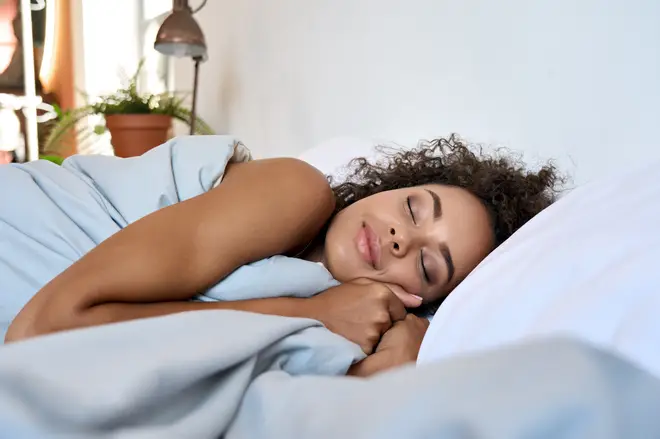How to get more deep sleep during the night
17 March 2023, 16:08

Deep sleep is so important for our physical and mental health – here's how to bank more.
If your quality of sleep has plummeted in recent years, it could be playing havoc with your physical and mental health.
Sleep is incredibly important for overall wellbeing and directly affects the way the body works, from impacting hormones and metabolism, to heart, circulatory, respiratory and immune systems.
What makes things trickier is people might think they're getting a decent amount of sleep at night, but is it good quality enough to be restorative?
Here, we break down the importance of banking enough deep sleep, and explain why this particular stage is so vital.

What is deep sleep?
Deep sleep, which is also referred to as slow-wave sleep or delta sleep, is the third stage of the sleep cycle.
It is a highly active process, despite the fact people snoozing have no clue of its arrival, and occurs during the non-rapid eye movement (NREM) block.
It follows stage one – those drowsy moments before you drift off, and stage two - light sleep, which makes up around half of your total sleep.
On an average night, a person goes through four to six cycles which last around 90-minutes each.
Explaining the third stage in more detail, the Sleep Foundation says: "During deep sleep, electrical activity in the brain appears in long, slow waves called delta waves.
"These waves have a frequency of 0.5 to 2 Hertz and they must make up at least 6 seconds of a 30-second window for that period to be considered deep sleep."
For most people, this regenerative stage happens in the first hour or two of the night, then occurs in shorter periods until morning.
It's when your breathing and heart rate are very slow and your muscles are super-relaxed, making it incredibly hard to be woken up.
In fact if you've even been rudely awaken and experience a groggy sensation for some time afterwards, it's probably because you were enjoying a nice slice of slow-wave.
Why is deep sleep so important?

Although all the stages of the sleep cycle are important, deep sleep is arguably the most crucial.
The NHS describes it as "the most restorative sleep stage" but explains that "all sleep stages play a vital role in keeping us healthy and functioning at our best".
Getting enough deep sleep means improved immunity, memory and muscle growth, as well as better heart, tissue and bone health, says the Sleep Foundation.
It helps to boost cognitive function and memory, making it particularly vital for developing brains, alongside regulating glucose metabolism and replenishing energy stores.
Studies have also shown this stage plays an integral role in allowing the brain to process the day's overload – that's before we've even mentioned the mood-boosting benefits.

Using Sophrology to alleviate sleep problems: a self-help guide
How to get more deep sleep
Sleep health is a hot topic as many people struggle to fall asleep – or stay asleep.
The impact of a bad night is bad enough, but consistently bad sleep can become a mental and physical health nightmare.
So, how can you bump up the amount of restorative deep sleep that's so beneficial to our bodies?
"The best way to get more deep sleep is to get enough total hours of sleep," explains the Sleep Foundation, adding: "Most deep sleep happens in the first hour or two of sleep. As a result, sleep habits that help people fall asleep faster may also help them to get more deep sleep naturally."
Reams of studies have been conducted over the years to discover how people can improve their bedtime routine, which sparks sleepiness more quickly.
Here are just a few suggestions:
Go to bed at the same time every night
According to the Sleep Foundation, an inconsistent sleep-wake schedule affects people’s circadian rhythms.
Minimise your stress
Stress and anxiety can impact the amount of deep sleep you manage so try some calming activities like breath work or yoga before bed.
Ditch the caffeine and alcohol
Booze and coffee are stimulants, so why not switch them out for soft drinks like herbal or decaf tea.
Create the perfect sleep environment
Loud noises and bright lights are a no-go so alter your space to include a dark, quiet, cool bedroom with some comfortable bedding.
Read more:
- Sleeping naked will actually make you hotter at night, expert claims
- People who nap for 15 minutes wake up feeling more refreshed, sleep expert reveals
- Mental health resources for you and your loved ones

































